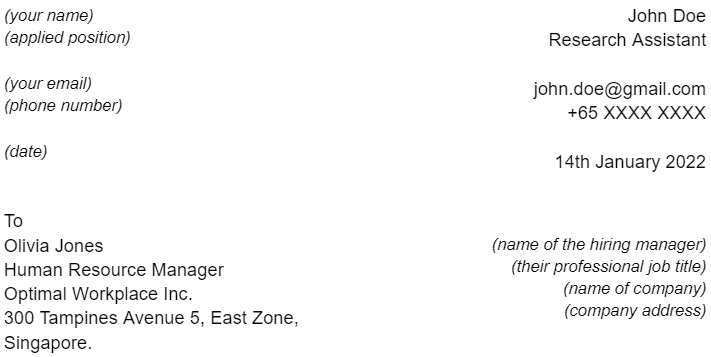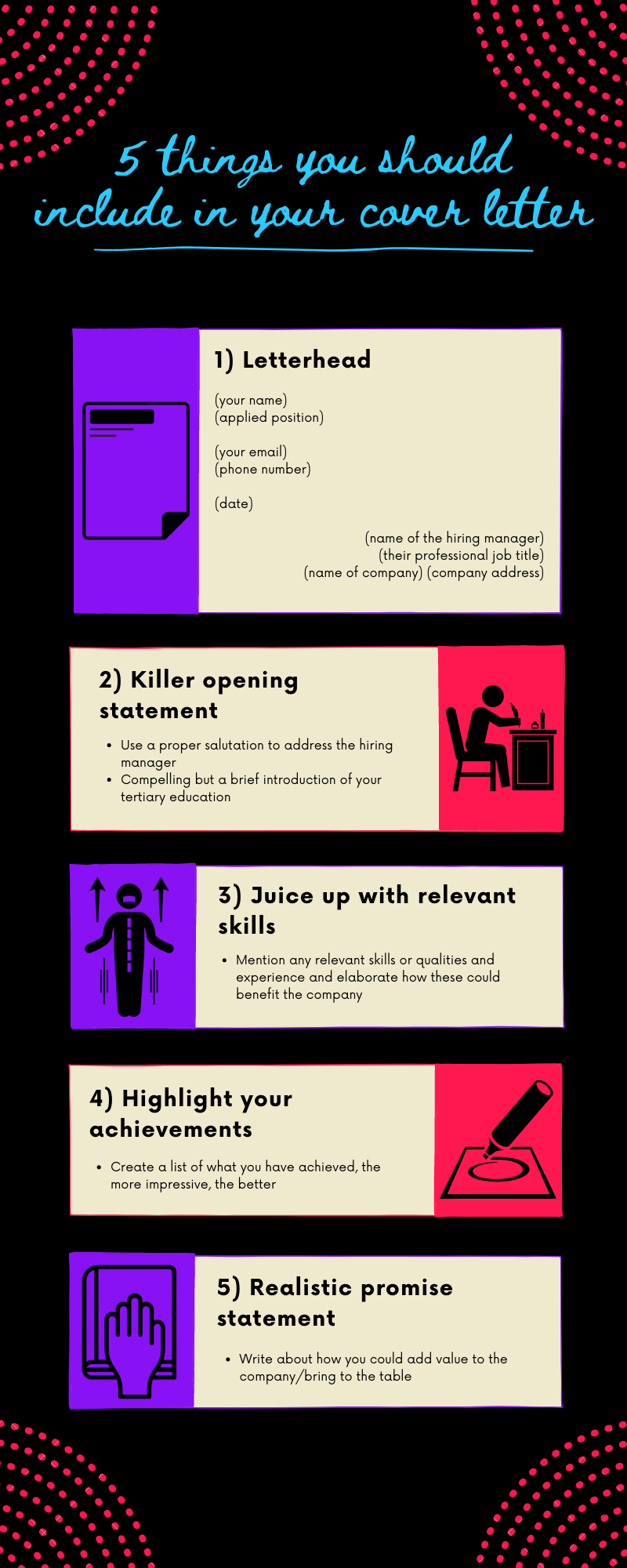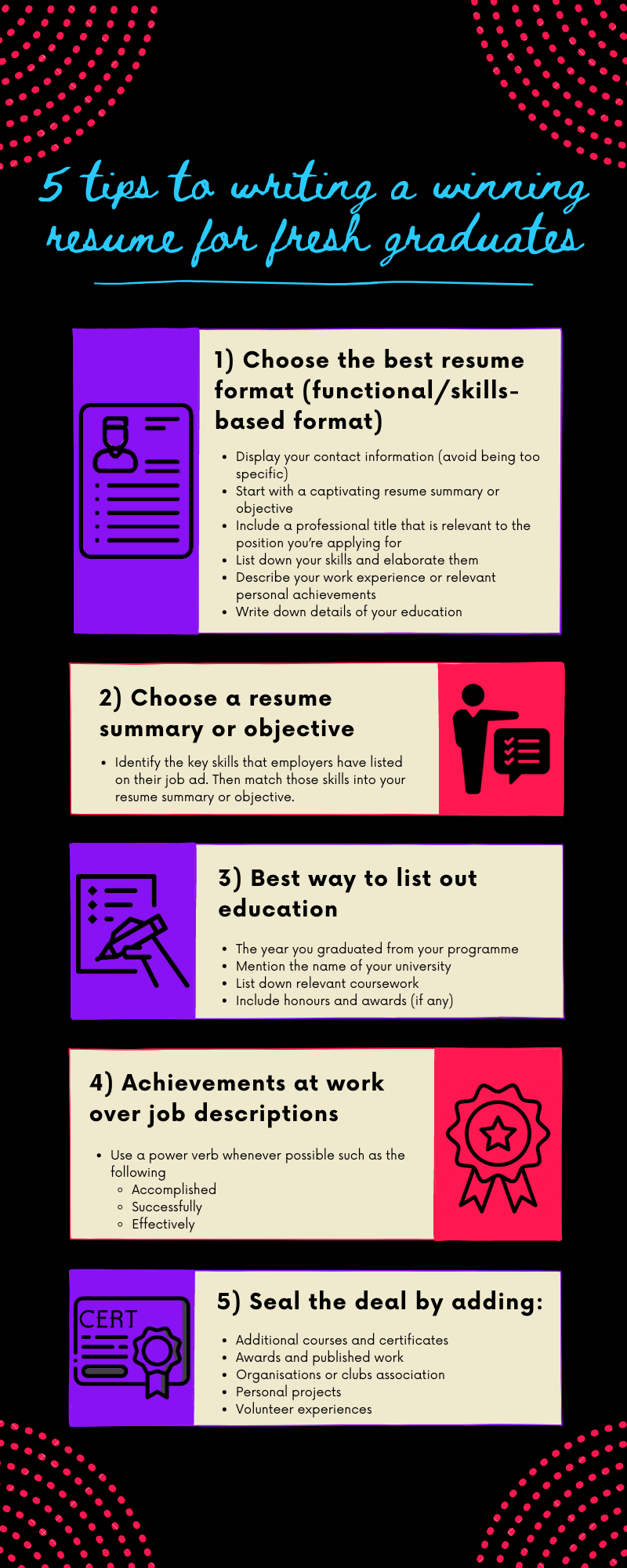
Prospective hiring managers take merely seven seconds to decide whether to pass your job application on to the next round or put it into a heaping pile of ‘maybe’ candidates. It’s already difficult to secure a job in this economy, let alone fresh graduates with no experience. However, all hope is not lost. 53% of employers claim that including cover letters with a resume will provide fresh graduates a better chance at securing a job.
A cover letter, typically accompanied by an exceptional resume, is basically a formal letter written in a professional tone. The purpose of the letter is to get prospective employers to have a better look at your skills and achievements and recognise your potential.
If written effectively, your carefully structured cover letters would help you grease the wheels to securing an interview session, and leave a strong, lasting impression. Doing so will help you stand out from a sea of candidates and hopefully get you through the next round of interviews.
Here’s a quick overview of the sections that we’ll be covering in this guide:

When it comes to fresh graduates, applying for a job is the ultimate challenge. The reality is, we’ve all been there, it’s just a matter of presenting yourself well. The key is to prepare for what’s coming, and adapt to the challenges.
Let’s look at the most common difficulties faced by fresh graduates and how to conquer them:
You must think it’s absurd for a fresh graduate to be expected to possess some working experience. Here’s the trick: Internships or a part-time job could help you fill that experience gap! How you performed at your workplace of choice sets the tone for your career. This shows your potential employers that you could manage a real-world setting.
Most fresh graduates make the mistake of ‘winging it’ when it comes to interviews. The reason such a session is even being held is to see if you could be a good fit for the role. So, do yourself a favour and nail those commonly asked interview questions (which you can read and prepare for in advance, you’re welcome!).
Hard or technical skills could be learned and trained, such as proficiency in a foreign language. Soft skills, however, are essentially your personal traits, for example critical thinking and teamwork. This is important for hiring managers as it serves as a rough indicator to determine the success rate of their company's new hire.

Here’s some good news for you though: Some companies prefer hiring fresh graduates, provided that you have the potential for the role. This is because they're considered a ‘blank canvas’, making it easier for them to be trained and acclimatised to the company culture.
Thus, it’s essential for you to create a great first impression during your initial interaction when applying for jobs. The first step is: Writing an outstanding cover letter.
First and foremost, you need to place this section at the top of your letter. It should consist of your contact information and the address of the company you’re applying to. Not only does it provide an organised structure, but it also makes it easier for employers to spot your contact details when they are interested in setting up an interview with you.
Here’s how your letterhead should look like:

Time to write a killer opening statement! But, do remember to use the proper salutation to address the hiring manager:
Write a compelling but brief introduction on your tertiary education. Then, explain why you’d be the ideal candidate for the job position:
Juice your letter with relevant skills, by mentioning your qualities as well as experience, and elaborate how these could benefit the company. You could mention any volunteer work, extra credit assignments, or other roles that are closely related to the position throughout your study.
Sell yourself by highlighting your achievements; it's okay to be a little bit extra and create an impressive list of what you have achieved throughout your years of dedicated study!
Add a powerful final closing statement so that you finish strong. Write a realistic promise statement on how you could add value to the company. Add a complimentary close along with your name and signature at the bottom.
Remember to:
Now that you know what to write, let’s check out what NOT to write.
1) Including your personal links on your cover letter
2) Focusing on previous job/internship responsibilities instead of achievements
3) Discussing your salary expectations
Read more: How to negotiate starting salary when you're a new graduate
We’ve covered the cover letters. Now it’s time to polish your resume so you’d be an even more ideal candidate!

The best format for a fresh graduate is functional or skills-based. Adopting this into your resume enables you to highlight your abilities and skills, rather than your experiences. Here's a quick run through:
Here’s a tip for you!
Identify the key skills that employers have listed on their job ad. Then match those skills into your resume summary or objective. This would make you an ideal candidate for the specific role!
Unless you’ve accomplished a close to 4.0 GPA, skip listing it on your resume. Also, avoid including high school diplomas since it’s no longer relevant. Follow this structure accordingly:
If you really want to stand out, consider removing your internship or relevant responsibilities, and replacing them with achievements at work instead. Simply use a power verb whenever possible such as “Accomplished, successfully, and/or effectively’. This will make you a more desirable candidate.

1) Customise each cover letter for different job applications
2) Use a professional font that is clear and legible
3) Rename and save your files properly with your nameHiring managers receive hundreds and thousands of job applications daily. If you don’t rename your file properly, it may be difficult for them to track your files.
4) Be honest on everything that you mention about yourself
Almost always, your employers would run a background search on you and will definitely find out if you ever deceive them on your job application

Fully utilising this extensive guide will provide you with a better chance at winning a sweet spot at your dream job. Remember to bring something extra to the table, such as a unique skill set, volunteering work and courses or certifications. Doing this will make you stand out among the other candidates.
Here’s are the summarised infographics you can easily refer to when writing cover letters or revamping your resume:

Extra notes:

Final tips:
All the best, and may you get that job you’ve always dreamed of!